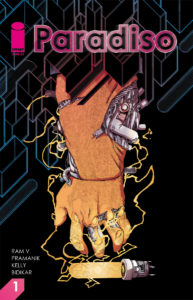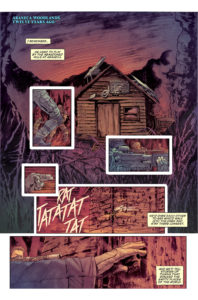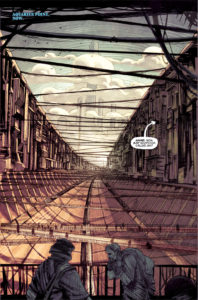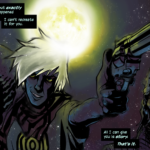
Paradiso follows Jack Kryznan’s fraught journey into the city of Paradiso, centuries after The Midnight Event changed the world forever. The first issue comes out in December, but we recently had a chance to chat with the creative team via e-mail about the series.
Read on to see what writer Ram V and artist Devmalya Pramanik have to say about the creation of Paradiso, their feelings on its characters, and some hints at where the series might be going.
 Rogues Portal: What was the main inspiration behind Paradiso?
Rogues Portal: What was the main inspiration behind Paradiso?
Ram V: It was one of those late night/early morning conversations with my good friend and architect Rajiv Bhakat. We’d both been writing on and off as a hobby in those days and we considered a story set inside a truly sentient and living city. A story where the setting was a character in her own right and a story that investigated the question, ‘What if the things and places we built, one day, tried to understand us in order to understand themselves?’
The idea just took on a life of its own from there, as ideas often do, turning into a many limbed creature of mystery, sci-fi and magic!
RP: What elements do you feel are most important to not only making this story successful, but to making it relevant in today’s comic landscape?
Devmalya Pramanik: In some way we are all looking for meaning. It’s the driving force of the human nature. And the story of Paradiso, on a deeper level, is about the consciousness’ need for meaning. People in a broken world trying to find their place along with a sentient city doing the same is what makes the story relatable I feel.
RV: Yeah, I’d agree. I think that underlying human story about the need for meaning is something that immediately makes things relatable. And that is key to telling a successful story. It all has to come back down to earth and mean something to the reader on a fundamental level. I don’t know that I am trying to make it relevant to today’s comic landscape in any way. I’m trying to tell a good story that works beyond its categorization. It’s a story that’ll hopefully give people something meaningful to take away at the end.
Beyond that I don’t concern myself with tailoring the story to fit a certain landscape. Good stories work regardless of where they’re given their first shape or form. Is it a story relevant to its time? Yes absolutely. I’ve never felt closer to the end that I am feeling now. But I am a hopeful person and Paradiso says there is hope. There is hope for us all because if humanity has one saving grace it is our ability to create things. What better way then, to tell that story than from the perspective of something we created?

RP: How does Paradiso stand out from other books of its kind?
RV: I think the premise itself is pretty distinct. We’ve seen things with sentience imparted to settings but I don’t think anything pushes it quite as far as we have with Paradiso. The city has motivation, needs, desires, aspirations and the human beings are little things caught in these currents of a much larger, bigger thing. I don’t think I’ve seen that done in quite the same way as we have. And then, of course, we change the lens with which each arc is viewed and told so that should always provide a new, fresh way of looking at Paradiso.
DP: I believe Paradiso is different in the way it uses technology. The world has lost touch with technology. Our understanding of it has gone backward and most of what had already been built has broken down. In that sense, Paradiso is a lot less technologically developed as well as bafflingly advanced at the same time. I think it’s a really unique way of exploring retro-futurism.
RP: Did you have a particular aesthetic in mind going into the story? How has that evolved as the series has started to come to fruition?
RV: Yeah, I had some idea of what I wanted the comic to look like. There was certainly intent to have Paradiso be this dusty, dry and harsh place. Full of hard edges, tall spires and the occasional glimpse of the uncanny. I think we really managed to infuse that into the book. A lot of it though, only developed after Dev got involved and rightly so. I tend to script for my artists so I try not to define things too much before I can see how the artist wants to approach the story.
DP: Starting out, the aesthetics for the world were a lot shinier and technologically intricate than they are now (not by a huge margin though). As we developed the story, it became simpler and it became a sparse and crafted/scavenged aesthetic. Everything is made from broken technology that has been dormant for hundreds of years. I enjoy that.

RP: What can readers expect from Paradiso as a series?
RV: They can expect to be surprised and to be constantly discovering layers of the city. They can expect to care about unexpected characters and be amazed by just how much of city can turn into something strange and magical.
DP: Robots, living cities, floating buildings, mysteries years in the making and at its core, a story of survival and resurrection. Robot battles. Many robot battles. And space vampires. No, scratch that… Or should you?
RP: Without giving too much away, can you tell us a little about the first arc?
RV: Without giving away too much, I’ll say this. Many years ago, long after The Midnight had ended the world, people waited for some sort of reprieve. Something that would change the course of a world tumbling toward its end. That is where we begin. A world and a city with its breath held for that moment of change. When we arrive at Paradiso’s outskirts in Issue #1 the events that start there, will have consequences for the human lives struggling with the city, the city herself and perhaps, (if you’re putting all the pieces together) the world itself.
RP: Are there any pop culture references or Easter Eggs dispersed in Paradiso?
RV: There are a few. Some pretty obvious. Others more obscure. But I won’t give any away. The whole point of Easter Eggs is to have it be a secret conversation for those ‘in the know’! And to make people go looking for them.
DP: There’s an “N7” marking on the outside of a Bunker wall… Alliance forever.

RP: If Paradiso were adapted into a film or TV series and you were in charge of casting, who would your stars be?
RV: Bill Nighy. I’ve got a character that that’s a perfect fit for Bill Nighy. That’s the only one I’d insist on! Dev’s got a few recommendations though.
DP: Ooh I have spent a fair share of time trying to do that in my head. For Jack, I must say Dev Patel would be a good fit. For Kruge I’d have to go with Idris Elba. Noira, I can’t imagine anyone other than Zoe Saldana playing. I could keep going, but the rest would be spoiler-y.
RP: How does each issue come to be? Is it a team effort from start to finish, or does each person do their portion of the issue separately?
DP: This book is very much a team effort. Ram plays a major part in directing and choreographing the pages with me. It’s a very collaborative process between all of us. While every part of our team is more than capable of handling their part of the job independently, we like to pass notes and help each other through our tasks together, making the whole thing feel even more cohesive as a result. I’m lucky to be working with such talented individuals, and I love doing what I do alongside them.
RP: Do you have a favorite character?
RV: They’re all equally loved. They’re all going to go through hell. I do like Honeybad though. I like him a lot.
DP: My favorite character is Kruge. He is portrayed as a bad person, but as you’ll come to see, no character in Paradiso is completely black or white. That’s what I always love about the characters in general. A villain who garners your sympathy with the simplest of acts. A hero who makes you doubt him with one wrong choice.
RP: If you were a character in this verse, who would you be? What would you do?
RV: I’d be the city, of course. I’d be Paradiso. I can see myself manipulating the lives of the little characters subject to my every whim.
DP: Oh, I think I’d still be a comic book artist. But I’d probably have to do it on my time since printable press would a very very rare luxury.
Paradiso #1 hits shelves December 6, 2017. You can keep up with Ram V and Devmalya Pramanik on Twitter.



